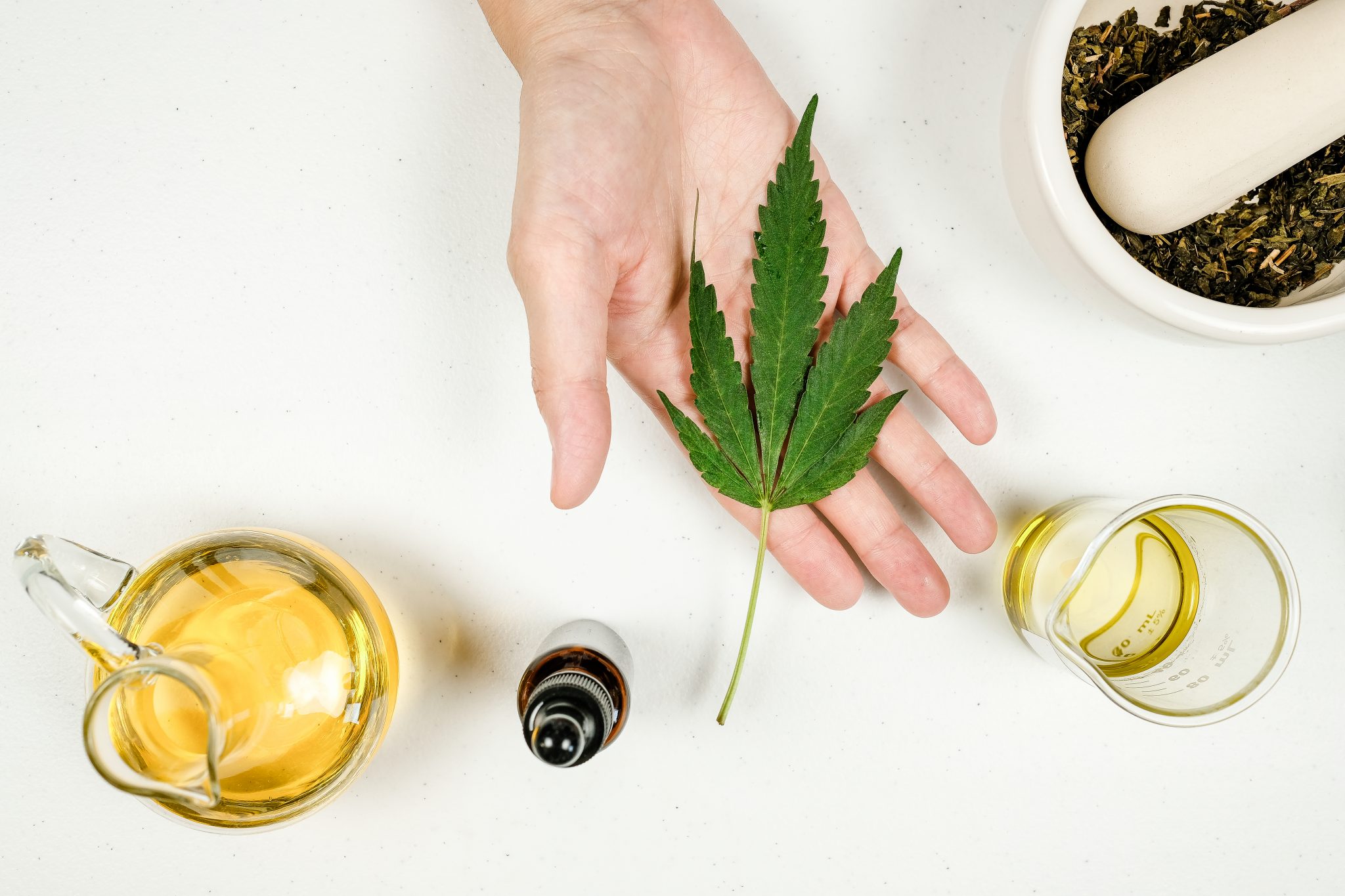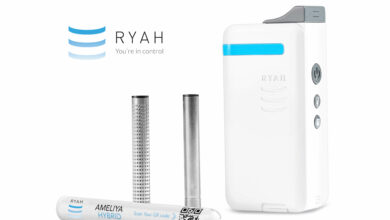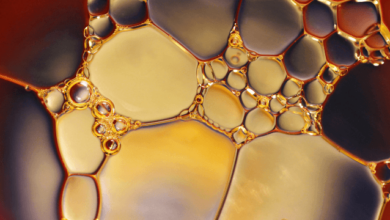
CBD oil and hemp oil are two completely different products derived from separate parts of the Cannabis Sativa plant (aka hemp plant), each with unique properties.
Cannabidiol (CBD oil) is a medicinal compound with numerous health benefits explained whereas hemp oil or more accurately ‘hemp seed oil’ is a nutritional superfood.
There is much confusion in the UK marketplace due to inaccurate or misleading labelling resulting in one product mistakenly purchased over the other.
This article will highlight what exactly each oil does, the differences between them both, and how to guarantee that you are purchasing exactly what you intended to.
What are the differences between UK hemp oil & CBD oil
Hemp oil comes specifically from the seeds of the cannabis or hemp plant whereas CBD oil comes from the fruiting flowers and, to a lesser extent, the leaves and stems.
Neither product is psychotropic, meaning regardless of the quantity taken, neither will produce any euphoric ‘high’ feeling typically associated with the cannabis plant. Rather, these oils are attributed to the potential prowess of preventing, managing, and even treating certain illnesses.
What is CBD oil?
Cannabidiol or CBD oil as it is more commonly known is a potent compound found in the hair-like resinous glands of the cannabis plant. It has been clinically proven to stop seizures in certain treatment-resistant cases of epilepsy, with further animal and cell studies showing it to have potential anti-anxiety, anti-nausea, anti-inflammatory, antipsychotic, anti-arthritic, and immunomodulatory properties.
Cannabidiol can interact either directly or indirectly with receptors located throughout the body's endocannabinoid system; responsible for maintaining numerous physiological and cognitive functions such as mood, memory, inflammation and a host more.
What is hemp oil?
Hemp oil, or hemp seed oil to be more accurate, is an oil that comes from the seeds of the cannabis or hemp plant when they are crushed. It is similar to olive oil in terms of uses but significantly greater in terms of nutrients.
It is most well known for having a greater balance than oily fish in terms of omega 3 & 6 (essential fatty acids which must be added to our diet as they are not made by the body).
Hemp oil is low in saturated fat and rich in polyunsaturated fat and is packed full of vitamins (in particular, A and D) and minerals all of which helps to maintain a healthy body.
What else is in the bottle?
Hemp oil should only ever contain hemp seed oil. There is no requirement to add further ingredients. In fact, unrefined ‘cold-pressed’ hemp oil is the most nutritious.
Due to CBD’s high viscosity (density) it is required to be added to a ‘carrier oil’ in order to be used efficiently and effectively. CBD oil can be added to MCT oil, olive oil, and even hemp oil.
Both have such a wide array of benefits that CBD oil in a hemp oil carrier will provide the best of both worlds. These two substances work great together but their similarities can sometimes cause confusion.
So why do the two confuse so many people?
Confusion arises first and foremost because the names are often used interchangeably by retailers, either knowingly or unknowingly.
CBD oil affords a higher premium and, as such, opportunistic retailers may have misleading labelling suggesting their hemp seed oil is, in fact, cannabidiol oil.
A largely unregulated market gives rise to this type of behaviour, so it is important to only purchase oils from trusted manufacturers and retailers who can provide 3rd party certificates of analysis. This will guarantee their products contain exactly what is advertised. Without such proof, an unsuspecting consumer may receive a product purporting to be CBD oil when what you’re actually buying is hemp seed oil or worse, no oil at all.
Uses of hemp oil and CBD oil
The uses of each oil are as multifaceted as the plant itself. Market predictions of year on year growth by global research firms are as a result of consumer uptake but also an increasing range of ways to consume these substances from the cannabis plant.
Hemp oil
Hemp oil is typically used in salad dressings to add a rich, nutritious and delicious nutty flavour to any meal. It can also be added to smoothies for a boost of essential fatty acids, vitamins and minerals.
In fact, hemp oil can be used where traditional oils such as olive oil would be, but It is advised not to use it for cooking, as subjecting it to high heat will result in a loss of nutrients.
Hemp seed oil is even becoming increasingly popular in skin and hair care products with major brands such as Kiehl’s adding it to their products due to its soothing, moisturizing, hydrating, and acne reducing effects on the skin.
Refined hemp oil is also used in fuels, plastics, lubricants, paints, inks and more.
CBD oil
CBD oil is infused in all manner of food, drinks, capsules, e-liquids, etc, with new products being developed every day. Speaking to various CBD stores such as The Tonic in Leeds, anecdotal evidence suggests the majority of people tend to use it for its anti-anxiety effects.
There is ample evidence to suggest that CBD may also be beneficial for treating pain associated with fibromyalgia, aid sleep, and could even help manage diabetes.

Over 5000 peer-reviewed articles have been published on the potential benefits of CBD but clinical research is required to determine if all these benefits can be replicated in humans.
CBD oil vs Hemp oil – Differences in benefits
Hemp oil is more of a preventative, with essential fatty acids, vitamins and minerals to aid healthy growth and repair, whereas CBD oil is used to treat and/or manage a number of physiological and cognitive illnesses and behaviours.
Benefits of hemp oil
Hemp oil contains a range of vitamins and minerals and, in particular, a perfect balance of omega 3 and 6 fatty acids in the form of alpha-linolenic acid and linoleic acid. These are known as essential fatty acids as the body is unable to produce them endogenously and therefore they must be included in our diet.
There are many benefits to hemp oil which include:
- Lowers high blood pressure and cholesterol
- Prevent heart attacks
- Reverse hardening blood vessels
- Improves the body's sensitivity to insulin
- Promotes healthy skin
- Supports a strong immune system
- Antioxidant effects
Benefits of CBD oil
Cannabidiol has taken the world by storm with an array of touted potential benefits. Clinical trials take time but there have been a huge number of studies into the effect of CBD on both human cells and animals, resulting in a mammoth list of benefits.
Most notably;
- Anti-Anxiety Effects
- Anti-Inflammatory Effects
- Analgesic Effects
- Anti-Catabolic Effects
- Anti-Seizure Effects
As more research comes to light we will gain a better understanding of the true potential of this wondrous plant. To date, there is research suggesting a myriad of potential benefits including, but by no means limited to, CBD oil as a potential treatment for insomnia.
Is hemp oil or CBD oil better for sleeping?
CBD’s anti-anxiety effects will help calm and relax a person prior to sleep, which for a lot of people is half the battle. One case study of a person living with anxiety and a sleeping disorder showed how cannabidiol improved both the quality and the duration of sleep.
CBD oil works by interacting directly and/or indirectly with receptors located throughout the body and the brain to promote sleep and relaxation.
CBD has also been shown to be a neuroprotective agent with the ability to restore hippocampal interneuron functions that become damaged following sleep deprivation.
Is CBD oil or hemp oil better as a supplement?
Hemp seed oil is high in beta carotene which is broken down in the small intestine to produce retinal, a form of vitamin A. Carotene can be stored in the liver and fat tissue and converted to retinal when needed.
Vitamin A helps create white blood cells (the body’s immune defence mechanism) as well as helping shape bones, improve vision and improve skin.
Is hemp oil or CBD oil better for easing anxiety?
CBD oil is synonymous with anti-anxiety. Its effects have been demonstrated in numerous human clinical trials. In a double-blind placebo-controlled study, 60 volunteers were given either CBD or a placebo. Two hours later they were given a random topic and two minutes to prepare before speaking in front of their respective groups.
Those who received the compound from the cannabis plant registered significantly reduced subjective anxiety compared to the control group.
In another simulated public speaking experiment, participants reported drastically lower anxiety, cognitive impairment, and discomfort in their speech compared to placebo.
Is hemp oil or CBD oil better for pain?
Cannabidiol regulates pain by influencing serotonin receptors located on the peripheral and central nervous system, known as the pain pathway.
When the human body is in pain it releases a natural chemical called anandamide which suppresses the feeling of pain. Unfortunately, this molecule is broken down quickly and easily by an enzyme called fatty acid amide hydrolase, ‘FAAH’. CBD has been shown to inhibit the production of FAAH, thereby prolonging the effects of anandamide and reducing the sensation of pain.
Additionally, glial cells in the body play a major role in pain amplification but CBD has been shown to suppress glial activity in cells.
Hemp oil, on the other hand, cannot provide pain relief but its optimum omega 3 content does have anti-inflammatory effects which can aid healing.
Is CBD oil and hemp oil safe?
Yes, hemp and cbd oil are both are perfectly safe. Over 5000 research papers published on the National Centre for Biotechnology comment on cannabidiol remarkable safety profile. In fact, one 2017 study goes a step further, suggesting that CBD “has a better side effect profile” than traditional drugs.
Following a surge in popularity, the World Health Organisation conducted its own review and deemed CBD to have “a good safety profile which was well tolerated in humans”.
Hemp seed oil has been documented for human use in food preparation for at least the past 2000 years according to Chinese texts and even Herodotus in his book ‘The Histories’ speaks of the Scythians using hemp seeds.
Conclusion
The benefits from CBD oil and hemp oil cannot be overstated and purchasing CBD oil that is contained in a hemp oil carrier results in the consumer getting the best of both worlds.
Hemp seed oil offers a perfect balance of essential fatty acids omega 3 and 6, vitamins, and minerals. CBD has incredible medicinal potential as an anxiolytic and an anticonvulsant, with more benefits being both suggested and clinically proven seemingly by the day.
Consumer interest is now leaning towards a CBD-focused market and, given its medicinal use, that is unsurprising. However, as general knowledge increases, it is believed that hemp oil will also see a surge in popularity once more.
If you are ever in doubt as to which oil is in the product you are considering, simply ask.





